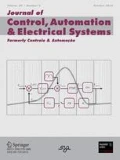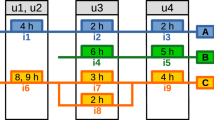Abstract
This work presents a modified version of the SCO (Supervisory Control and Optimization) methodology, proposed in Pena et al. (Inf Sci 329:491–502, 2016) to deal with planning problems in flexible manufacturing systems. Although having proved to be an alternative to deal with this class of problems, the SCO methodology is limited by the fact that it can only be applied to deal with small batches of products. Previous works show that when considering manufacturing systems of a moderate degree of complexity, this approach is only efficient to generate solutions for batches containing very few products, as for larger batches, the necessary computational time to process a solution is very high. It is obvious that, for the problems in the real world, this dimension of production is very small, which, at first, makes the application of SCO methodology quite limited. Therefore, this work proposes a complementary approach to SCO, here called SCO-Concat, developed to carry out the planning in larger batches of production. The proposed methodology was tested in a plant of moderate size, and the results obtained show that planning for batches as large as desired can be achieved in an efficient manner by SCO-Concat at a very reduced computational cost.

Similar content being viewed by others
References
Abdeddaim, Y., & Maler, O. (2001). Job-shop scheduling using timed automata. In Proceedings of the 13th international conference on computer aided verification, CAV 2001 (Paris, France), Springer, pp. 478–492.
Alves, L. V. R., Bravo, H. J., Pena, N., & Takahashi, R. H. C. (2016). Planning on discrete events systems: A logical approach. In Proceedings of the 12th conference on automation and engineering (CASE’16) (Fort Worth, TX), pp. 1055–1060.
Aytug, H., Lawley, M. A., McKay, K., Mohan, S., & Uzsoy, R. (2005). Executing production schedules in the face of uncertainties: A review and some future directions. European Journal of Operational Research, 161, 86–110.
Bellman, R. E. (1957). Dynamic programming. Princeton, NJ: Princeton University Press.
Bertsekas, D. P. (1985). Dynamic programming—deterministic and stochastic models. Upper Saddle River, NJ: Prentice-Hall.
Brandin, B. A., Wonham, W. M., & Benhabit, B. (1992). Supervisory control-a timed discrete event system approach. In Proceedings of the IEEE international conference on robotics and automation (Nice, France), vol. 2, pp. 931–936.
Cassandras, C., & Lafortune, S. (2008). Introduction to discrete event systems (2nd ed.). New York, NY: Springer.
Chan, F. T. S., Chan, H. K., & Lau, H. C. W. (2002). The state of the art in simulation study on FMS scheduling: A comprehensive survey. The International Journal of Advanced Manufacturing Technology, 19(11), 830–849.
Dimopoulos, C., & Zalzala, A. M. S. (2000). Recent developments in evolutionary computation for manufacturing optimization: Problems, solutions, and comparisons. IEEE Transactions on Evolutionary Computation, 4(2), 93–113.
Fabre, E., & Jezequel, L. (2009). Distributed Optimal Planning: an Approach by Weighted Automata Calculus. In Proceedings of the 48th IEEE conference on decision and control, held jointly with the 2009 28th Chinese control conference. CDC/CCC 2009 (Shanghai, China), IEEE, pp. 211–216.
Ghallab, M., Nau, D., & Traverso, P. (2004). Automated planning: Theory and practice (1st ed.). San Francisco, CA: Elsevier.
Helsgaun, K. (2000). An effective implementation of the Lin–Kernighan traveling salesman heuristic. European Journal of Operational Research, 126, 106–130.
Jezequel, L., & Fabre, E. (2012). Turbo Planning. In Proceedings of the 11th international workshop on discrete event systems (WODES’12) (Guadalajara, Mexico), pp. 301–306.
Kobetski, A., & Fabian, M. (2006). Scheduling of Discrete Event Systems using Mixed Integer Linear Programming. In Proceedings of the 8th international workshop on discrete event systems (Michigan, USA).
Lawley, M., Reveliotis, S., & Ferreira, P. (1997). Flexible manufacturing system structural control and the neighborhood policy. 1. Correctness and scalability. IIE Transactions, 29(10), 877–887.
Maldenovic, N., & Hansen, P. (1997). Variable neighborhood search. Computers and Operations Research, 24, 1097–1100.
Nishi, T., Wakatake, M., & Inuiguchi, M. (2008). Decomposition of timed automata for solving scheduling problems. In Proceedings of the IEEE international conference on systems, man and cybernetics (Singapore).
Oliveira, A. C., Costa, T. A., Pena, P. N., & Takahashi, R. H. C. (2013). Clonal selection algorithms for task scheduling in a flexible manufacturing cell with supervisory control. In Proceedings of the 2013 IEEE congress on evolutionary computation (CEC), pp. 982–988.
Pan, Y., & Shi, L. (2008). New hybrid optimization algorithms for machine scheduling problems. IEEE Transactions on Automation Science and Engineering, 5(2), 337–348.
Panek, S., Stursberg, O., & Engell, S. (2004). Job-shop scheduling by combining reachability analysis with linear programming. In Proceedings of the IFAC workshop on discrete event systems (7th edition), WODES’04 (Reims, France), pp. 199–204.
Pena, P. N., Costa, T. A., & Takahashi, R. H. C. (2016). Control of flexible manufacturing systems under model uncertainty using supervisory control theory and evolutionary computation schedule synthesis. Information Sciences, 329, 491–502.
Pinha, D. C., Queiroz, M. H., & Cury, J. E. R. (2011). Optimal scheduling of a repair shipyard based on supervisory control theory. In Proceedings of the 2011 IEEE conference on automation science and engineering (CASE) (Trieste, Italy), pp. 39–44.
Queiroz, M. H., & Cury, J. E. R. (2000). Modular supervisory control of large scale discrete event systems. In Proceedings of the 5th workshop on discrete event systems (WODES’00) (Ghent, Belgium), pp. 103–110.
Queiroz, M. H., Cury, J. E. R., & Wonham, W. M. (2005). Multitasking supervisory control of discrete-event systems. Discrete Event Dynamic Systems: Theory and Applications, 15, 375–395.
Ramadge, P. J. G., & Wonham, W. M. (1989). The control of discrete event systems. Proceedings of IEEE, Special Issue on Discrete Event Dynamic Systems, 77, 81–98.
Ramadge, P. J. G., & Wonham, W. M. (1989). The control of discrete event systems. Proceedings of the IEEE, 1, 81–98.
Su, R. (2012). Abstraction-based synthesis of timed supervisors for time-weighted systems. In Proceedings of the 11th international workshop on discrete event systems (WODES’12) (Guadalajara, Mexico), pp. 128–134.
Sundström, N., Wigström, O., & Lennartson, B. (2017). Conflict between energy, stability, and robustness in production schedules. IEEE Transactions on Automation Science and Engineering, 14, 658–668.
Vaz, A., & Wonham, W. (1998). On supervisor reduction in discrete-event systems. International Journal of Control, 44, 475–491.
Vilela, J. N., & Pena, P. N. (2016). Supervisor abstraction to deal with planning problems in manufacturing systems. In Proceedings of the 13th international workshop on discrete event systems, WODES’ 16 (Xi’an, China), pp. 117–122.
Ware, S., & Su, R. (2017). Time optimal synthesis based upon sequential abstraction and its application to cluster tools. IEEE Transactions on Automation Science and Engineering, 14, 772–784.
Acknowledgements
The authors gratefully acknowledge the support of the Brazilian agencies CNPq, Fapemig and Capes/PROCAD. This work was also supported by a Marie Curie International Research Staff Exchange Scheme Fellowship within the 7th European Community Framework Programme.
Author information
Authors and Affiliations
Corresponding author
Rights and permissions
About this article
Cite this article
Costa, T.A., Pena, P.N. & Takahashi, R.H.C. SCO-Concat: a Solution to a Planning Problem in Flexible Manufacturing Systems using Supervisory Control Theory and Optimization Techniques. J Control Autom Electr Syst 29, 500–511 (2018). https://doi.org/10.1007/s40313-018-0386-7
Received:
Revised:
Accepted:
Published:
Issue Date:
DOI: https://doi.org/10.1007/s40313-018-0386-7




